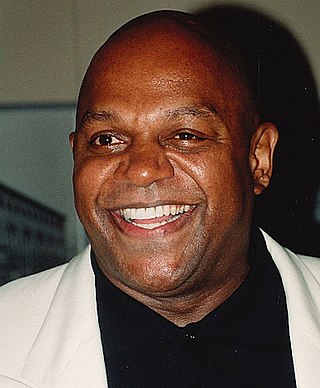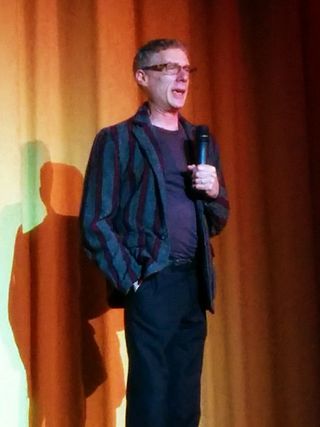Related Research Articles

Charles Stanley Dutton is a retired American actor and director. He is best known for his roles in the television series Roc (1991–1994) and the television film The Piano Lesson (1995), the latter of which earned him a Golden Globe Award nomination. His other accolades include three Primetime Emmy Awards and three NAACP Image Awards.
Robert F. Colesberry Jr. was an American film and television producer, best known as a co-creator of the television series The Wire (2002–2008) for HBO, executive producer of the miniseries The Corner (2000), and a producer for Martin Scorsese's After Hours (1985), Alan Parker's Mississippi Burning (1988), and Billy Crystal's 61* (2001). Colesberry was also an occasional actor.
Steve Yeager is an independent filmmaker from Baltimore, Maryland, U.S. He is best known for his film on the indie filmmaking of fellow director John Waters, titled Divine Trash, which won the Filmmakers Trophy for Best Documentary at the Sundance Film Festival in 1998.
Thomas Furneaux Lennon is a documentary filmmaker. He was born in Washington, D.C., graduated from Phillips Exeter Academy in 1968 and Yale University in 1973.

Jon Alpert is an American journalist and documentary filmmaker, known for his use of a cinéma vérité approach in his films.
Artist Dan Keplinger was featured in the Oscar-winning documentary short, King Gimp. Born with cerebral palsy, he lives in Towson, Maryland, where he continues to paint.

Taxi to the Dark Side is a 2007 American documentary film directed by Alex Gibney, and produced by Gibney, Eva Orner, and Susannah Shipman. It won the 2007 Academy Award for Best Documentary Feature. It focuses on the December 2002 killing of an Afghan taxi driver named Dilawar, who was beaten to death by American soldiers while being held in extrajudicial detention and interrogated at a black site at Bagram air base.

Matthew O'Neill is a documentary filmmaker best known for his work on the HBO film Baghdad ER, for which he and co-creator Jon Alpert won three Emmy Awards.

Parkville High School (PHS) is a four-year public high school in Baltimore County, Maryland, United States. The school was originally established in 1953 on what is now the location of Parkville Middle School. The current high school building opened in 1958. Area middle schools include Parkville Middle, Loch Raven Academy, and Pine Grove Middle.

Michael Bacon is an American singer-songwriter, musician and film score composer. He is the older brother of actor Kevin Bacon. He is a faculty member in music at Lehman College.
James Yoshimura is an American writer and producer, best known for his screenwriting work on the NBC series Homicide: Life on the Street and the short-lived Fox series The Jury, for which he served as a co-creator. He also co-wrote Homicide: The Movie, a made-for-television film that came out in 2000, after the series ended. Yoshimura has received two Emmy Award nominations: one for Homicide: The Movie and one for the Homicide episode "Subway", which also won a Peabody Award for excellence in television broadcasting.

Jeffrey Friedman is an American filmmaker. In 2021, he and Rob Epstein won a Grammy Award for their work on the documentary film Linda Ronstadt: The Sound of My Voice
Michael R. Lawrence is an American filmmaker and screenwriter living in Baltimore, Maryland. He has produced documentary films for PBS, HBO, CNN, and the Library of Congress, as well as making independent films.
Donald L. Leifert Jr. was an American sci fi/horror film actor, writer, teacher, and film historian.

One Minute to Nine is a 2007 documentary film written and directed by Tommy Davis and produced by Quinto Malo Films. It was later re-edited and screened on HBO as Every F---ing Day of My Life. The film chronicles the last five days of freedom for Wendy Maldonado before she and her son are sentenced for the manslaughter death of her husband and explores the years of domestic abuse the family experienced prior to his death.
Robert Maier is an American writer, director, producer and production manager, best known for his long collaboration with filmmaker John Waters.

Crisis Hotline: Veterans Press 1 is a 2013 documentary film about the Veterans Crisis Line, directed by Ellen Goosenberg Kent and produced by Dana Perry. The film was edited by Geof Bartz, A.C.E and co-edited by Gladys Mae Murphy. The cinematography was done by Tony Hardmon. It won the Academy Award for Best Documentary at the 87th Academy Awards.

Just, Melvin: Just Evil is a 2000 American documentary film by James Ronald Whitney about his grandfather, Melvin Just, and the devastating consequences of the sexual abuse that Just inflicted on their family. The film premiered at the 2000 Sundance Film Festival and aired on HBO on April 22, 2001. The film was well received overall; critic Roger Ebert called Just, Melvin "one of the most powerful documentaries I've seen."

A Girl in the River: The Price of Forgiveness is a 2015 documentary film directed by Sharmeen Obaid-Chinoy about honor killings in Pakistan. The film is produced by Tina Brown and Sheila Nevins in collaboration with HBO Documentary Films. A Girl in the River was edited by Geof Bartz, A.C.E. The documentary earned widespread critical acclaim. A Girl in the River was shortlisted with ten other documentaries from 74 entries submitted to 88th Academy Awards in Documentary Short Subject category, which it won.
Geof Bartz is an American documentary film editor, producer, and educator noted for his work on Pumping Iron. He has edited four films that have won Academy Awards.
References
- ↑ "Documentary Winners: 2000 Oscars" – via YouTube.
- ↑ "New York Times: King Gimp". Movies & TV Dept. The New York Times . 2009. Archived from the original on 2009-05-10. Retrieved 2008-05-30.
- ↑ "60th Annual Peabody Awards". May 2001.